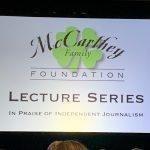By Eric Snow, Carbon High Journalism Advisor
Carbon High student Hannah Ludington garnered state recognition with her entry in the High School Journalism competition at Rowland Hall School in Salt Lake City.
The State High School Journalism competition was announced at the Utah Conference of High School Media that took place at Utah Valley University on Friday, Sept. 13, and Mr. Snow challenged his students to enter. Ludington is freshman member of Carbon High School’s journalism class, and she strives with every story she writes to present the information in the most unbiased way she can.
Students were assigned to write on a quote by George W. Bush: “Power can be addictive. And it can be corrosive. And it’s important for the media to call to account people who abuse their power.” Hannah’s essay was chosen as a finalist, so she was invited to the awards ceremony on Saturday, Nov. 9, at Rowland Hall Academy in Salt Lake City. Aside from being honored for her work, Hannah was able to hear a guest lecture from Pulitzer Prize-wining author and presidential historian Jon Meacham.
Carbon High School is proud of the work the journalism students do, and Carbon School District is especially proud of Hannah. Her essay shows the depth of her knowledge and reasoning:
There is a portentous amount of denigration being aimed at the media today. This judgement is being made by the same people of which the media strives to protect and inform of deceits and maladministration. While many of the population would undoubtedly reject or dismiss these claims, that stubbornness does nothing to diminish the importance of a free press. George W. Bush said, “Power can be addictive. And it can be corrosive. And it’s important for the media to call to account people who abuse their power.” This quote is a realization of sorts; that the media is a non-negotiable necessity for a harmonious balance. There is a reason why freedom of the press is such a treasured tradition in this country. Freedom of information is such an important principle that it has been fought for and won back many times over. While far from perfect, the media has worked tirelessly throughout the country’s relatively short history to expose official corruption and contempt for a free, open society. Members of the free press carry a heavy responsibility to not only report events honestly and accurately, but to help the average American citizen to interpret the meaning and import of this information.
After World War II, there was an intense period of general mistrust of Communists. This suspicion had neighbor turning against neighbor in blind accusations that often had sprung from a bed of lies. This was known as the “Second Red Scare.” In 1947, a man named Joseph McCarthy was elected to the senate by the people of Wisconsin. He became quite popular by sending out lists of “potential communists” that worked within the state department. With encouragement from other politicians and the public’s own wariness of subversion, he continued to freely accuse and fabricate information by his own choosing. In the end, accusations were levied against hundreds of individuals encompassing the federal government, universities and the film industry. In this case, the media was initially complicit as McCarthy’s mouthpiece. The American news media fed McCarthy the publicity he needed with their page-one articles and lead air-time. Gradually, individuals in the media began to see through McCarthy’s deceptions; and tirelessly worked to expose him and his villainous bullying. When McCarthy was censured in 1954, news exploded and everyone eagerly awaited the truth. This did not, however, help the individuals who had already lost their jobs and support. McCarthy had ruined lives. A small comfort is offered by the many who have said that the members of today’s media are more prepared to combat demagogy than were those of McCarthy’s time.
June 17, 1972, five burglars were caught sneaking in and out of the office of the Democratic National Committee located in the Watergate complex. It was revealed that these men were formally involved with Richard Nixon, who at the time was the thirty-seventh United States president facing his re-election campaign. Nixon’s committee had been setting up wiretaps and stealing material pertaining to his future opponents. While Nixon himself denied any involvement in the commitment of the crime, the politician tried to cover it up as quickly as possible. He spent many months weaving a web of lies and avoidance. The press coverage of the time played a large role in making information available to the general public who needed convincing that the Watergate Scandal was criminal in nature; and that it had been directed from or near the Oval Office against President Nixon’s opponents. Those watching current events might recognize the Nixon administration’s tactics of accusing the media of making wild accusations, putting too much emphasis on the story, and of having a liberal bias.
Examples abound of the news media’s role in policing the government of the United States. They carry a taxing responsibility to reliably report the actions and inactions of those whom have been chosen to be in power. When they do their job well, insist on reporting facts regardless of cries of “witch hunt” and “bias,” the citizens of the United States are better prepared to select and support worthy leaders and representatives. When the media fails to critically evaluate the information they are reporting; lives can be destroyed as seen during McCarthy’s Era. As George Bush so aptly stated in the above quote, it is vital for the media to continue to call to account people from both sides of the political aisle who abuse their power, undermine the interests of the American people, or otherwise break the trust that has been placed in them.




